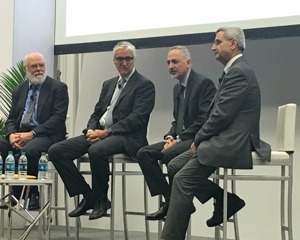ABB Customer World: How R&D keeps pace with technological advances in oil and gas
By Ashley Smith, Digital Editor, Hydrocarbon Processing
HOUSTON -- During a CTO panel discussion, Ahmed Hashmi, head of upstream technology at BP, discussed how research and development in the oil and gas industry is keeping up with the increasing change in technology, and where the future of R&D will take the industry, at ABB Customer World Wednesday morning.

“I’ve worked on the intersection of technology and business most of my career, so I don’t think of myself as the CTO of the company,” Hashmi said. “I think of myself as a business leader who’s driving change.”
Now, the change that is talked about in the industry is through digitization, Hashmi said, but a few years ago, it was enhanced recovery.
RESETTING THE INDUSTRY
In 2014, the industry fell, hard, Hashmi said, and overnight BP lost 50% of its revenue. There was massive inflation in the industry, according to Hashmi, because the industry had set itself with an expectation that it was only up.
This has left the industry with a deep desire to re-set itself, Hashmi said, and there is a transformation happening in all walks of the industry, including upstream and downstream.
“Everything is being reset and technology is playing a big role in that,” Hashmi said.
Through that transformation, Hashmi noted two major points of interest the industry needs to focus on changing.
Understanding data. A lot of the technology that the industry has deployed over the last few years are around sensing and the ability to make sense of what is already being collected. At a time, to automate, a programmer would have to write controller logic to make the controller talk to the automation abilities. There was no visualization software available, where now it is, and has become easier.
“Digitization has been around the industry for a long time,” Hashmi said. “But now, the hardware is finally catching up to the vision.”
Where the issue lies now, is the software is still too slow, Hashmi explained. What the industry needs to is to automate software development to keep pace with the rapid increase of technology.
Clock speed. The industry used to operate on a 10‑15 year clock speed, from discovery to finally production, Hashmi said. But now, the clock speed has gone down to less than 2 years from discovery to production.
“That’s the future,” Hashmi said. “And what that requires, I think, is a mindset change in all of us. My clock speed, as an individual working in this industry, has to match the clock speed of the technology that I’m now working with.”
BEST PRACTICES
Outcome is the most important aspect to focus on in the research and development, according Hashmi. If a person knows what problem they are trying to pursue, then they can change how the progress is going.
In order to understand what outcome is needed, those in R&D need to work with, and understand, those who are in the business, Hashmi said.
“My view is, if I don’t understand the business, as the head of technology, and I’m not in tune with the needs of the business, then I’m not doing my job,” Hashmi said.
He explained how his role is to translate the needs of the business to his team, then align resources with the urgent, highest value needs.
On the other side of the coin, Hashmi said, those in R&D have to also look at those things that have not been asked for, but could change the industry for the better.
“The role of technology is to bring things that nobody is asking for as well,” Hashmi said. “But could have a big impact.







Comments